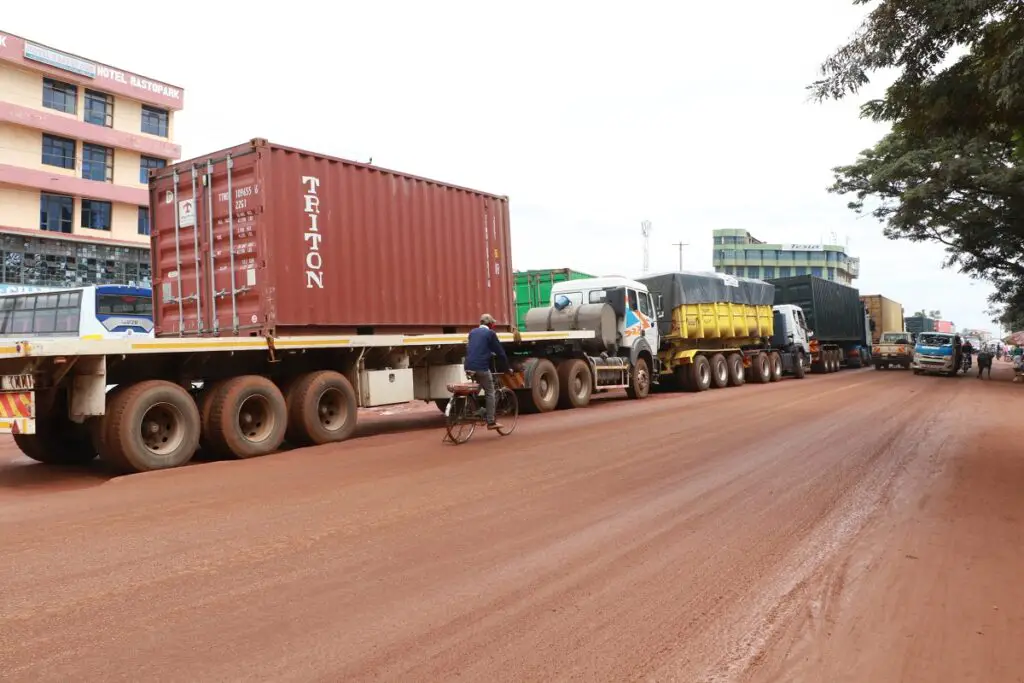- This strategic agreement aims to reduce border congestion, enhancing trade flow in a key African economic corridor.
- Congestion at borders, especially in the Tororo and Busia areas, has long slowed the efficient transport of commodities throughout the region.
- The idea calls for new border crossings to be set up at Mulwadda and Buteba to relieve traffic at Busia and Malaba.
Kenya and Uganda have signed a historic deal to reduce congestion at key border crossings, significantly boosting East African trade. To facilitate trade between Uganda, Rwanda, Burundi, the Democratic Republic of the Congo, and South Sudan, the highest-ranking officials have signed an agreement to build a dual carriage road along the Northern Corridor.
Congestion at borders, especially in the Tororo and Busia areas, has long slowed the efficient transport of commodities throughout the region; this project aims to alleviate this problem. The economies that rely on this route for imports and exports will benefit greatly from the new infrastructure since it will make trade easier and faster.
New Kenya and Uganda infrastructure deal
The idea calls for new border crossings to be set up at Mulwadda and Buteba to relieve traffic at Busia and Malaba. There will be less waiting time for trucks at the border because of these improvements, which will speed up trade and may even stimulate economic growth in the area.
With East Africa’s rising trade volumes, this is an especially significant change. The new infrastructure will likely play a crucial role in improving regional trade efficiency, as over 3,000 trucks traverse the Busia and Malaba borders daily, and exports are on the rise, particularly from Uganda.
One of the most important factors in the continent’s economic growth is intra-regional trade, which this agreement will facilitate. This action is consistent with the broader push to promote economic cooperation and integration in the East African Community and beyond.
Read also: Dubai Ports World’s 30-year concession and the future of Dar es Salaam Port
Enhanced Trade Capacity: Projected Impact and Value
The newly negotiated infrastructure contract between Kenya and Uganda is a strategic investment with the potential to increase bilateral trade greatly and not just a solution to the existing congestion difficulties. According to experts, the improved trade routes are expected to increase trade volume between the two countries. The proportion of prospective increase depends on numerous factors, including the efficiency of implementation and area economic trends. However, with the existing trade levels, even a small increase in border efficiency might result in tens of millions of dollars in additional commerce per year.
Opportunities in agriculture, industry, and consumer goods could be expanded for Kenya, a country whose exports to Uganda were over US$831.92 million in 2021, thanks to the new routes being built. These changes may increase exports from Uganda, which in 2020 were worth $465.55 million, particularly in agricultural products and raw minerals.
Further, the savings in energy and money from fewer border crossings will be a boon to both economies. Lower transportation costs, more consistent delivery schedules, and ultimately more competitive pricing might be expected from streamlined border processing. This efficiency boost is vital for local businesses and may attract additional international investment due to the region’s enhanced competitiveness in global markets.
Employment opportunities in both nations are anticipated to rise due to this infrastructure investment, both during and after completion. If border towns get better roads, they can benefit economically and see urbanisation as a result of the easier flow of products and services.
The finalisation of this project is expected to boost economic activity, strengthening Kenya’s and Uganda’s roles as major nodes in the East African trade network.
Read also: How Taveta-Holili chokepoint is fueling Kenya-Tanzania trade war
Addressing Trade Challenges within the East African Community
While the new infrastructure deal between Kenya and Uganda will likely improve bilateral trade, it is essential to acknowledge the obstacles within the East African Community (EAC) that prevent regional business from reaching its full potential. Non-tariff barriers (NTBs), an ongoing problem in commerce between the two countries, are the main obstacle.
Time-consuming and confusing customs procedures, varying enforcement of regulations, and a lack of suitable infrastructure at some border crossings not covered by the new agreement are all examples of NTBs. These problems include lengthy holdups, higher trade expenses, and unpredictability in the flow of goods. The issue is made worse because member states’ political difficulties and policy differences may lead to trade disputes and border closures.
For instance, trade has traditionally been hindered by varied standards, certification requirements for goods, and regular checks. The lack of harmonisation of EAC trade policies and procedures is another major obstacle for small-scale businesses. This mismatch disproportionately impacts informal and cross-border traders, who play a crucial part in the economy of both Kenya and Uganda.
To fully realise the potential of the upgraded infrastructure, these non-tariff impediments must be removed. Effective remedies could include harmonising customs procedures, enacting more consistent trade regulations, and investing in capacity-building for small-scale traders. In addition, trade between the two countries can only function smoothly if political relations are stable and lines of communication are kept open.
To boost trade efficiency and economic growth inside the EAC, it is essential to address the NTBs, even though creating improved trade routes is a big step forward. By working together to solve these problems, Kenya, Uganda, and their EAC allies might realise the full potential of the region’s trade capacity.
